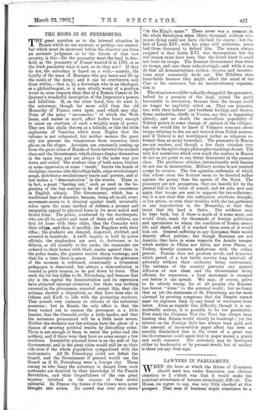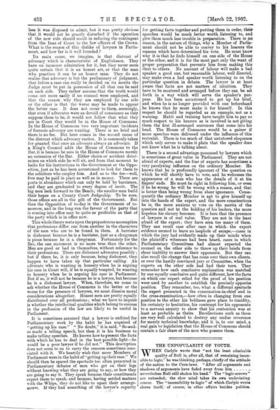LAWYERS IN PARLIAMENT.
WHEN the hour at which the House of Commons should meet was under discussion one obvious objection to 2 o'clock was that it would make the punctual attendance of lawyers exceedingly difficult. The House, we regret to say, was very little shocked at this prospect. That men of business might sometimes be a loss it was disposed to admit, but it was pretty obvious that it would not be greatly disturbed if the .operation of, the new rule should result in reducing the contingent from the Inns of Court to the law officers of the Crown. What is the reason of this dislike of lawyers in Parlia- ment, and how far is it well founded ?
Its main cause, we imagine, is that distrust of advocacy which is characteristic of Englishmen. They have an immense admiration for it, but they never seem quite certain that it is an honest art, or that the man who practises it can be an honest man They do not realise that advocacy is but the preliminary of judgment, that before a case can really be decided on its merits the Judge must be put in possession of all that can be said on each side. They rather assume that the truth would come out more easily if no counsel were employed, and that the reason why they are employed by one side or the other is that the worse may be made to appear the better case. It does not occur to them, seemingly, that even if advocates were as devoid of conscience as they suppose them to be, it would not follow, that what they are in Court_ they would be in the House. of Commons. In the House of Commons two very important incidents of forensic advocacy are wanting. There is no brief and there is no fee. But here comes in the second cause of the distrust which advocacy excites. It is commonly taken for granted that once an advocate always an advocate. If a King's Counsel adds the House of Commons to the Bar, it is because he sees in the House of Commons merely an extension of the Bar. Either choice or accident deter- mines on which side he will sit, and from that moment he looks for his instructions to the Government or the Oppo- sition, just as he has been accustomed to look for them to the solicitors who employ him. And as to the fee—well, fees may be paid in place as well as in money. There are posts in abundance which can only be held by banisters, and they are graduated to every degree of merit. The big men look forward to the Bench; the smaller men build their hopes on a County Court Judgeship. To be sure, those offices are all in the gift of the Government. But then the Opposition of to-day is the Government of to- morrow, and in the long run the favour of the party that is coming into office may be quite as profitable as that of the party which is in office now.
This whole theory rests upon the preposterous assumption that professions differ one from another in the characters of the men who are to be found in them. A barrister is dishonest because he is a barrister, just as a clergyman is pious because he is a clergyman. Fortunately for the Bar, the one statement is no more true than the other. Men are good or bad in themselves, without reference to their professions. There are dishonest advocates possibly ; but if there be, it is only because, being dishonest, they happen to have taken up that particular calling. An advocate who is wanting m honesty when he is arguing his case in Court will, if he is equally tempted, be wanting in honesty when he is arguing his case in Parliament. But if so, it will not be because he is a lawyer, but because he is a dishonest lawyer. When, therefore, we come to ask whether the House of Commons is the better or the worse for the presence of lawyers, we must dismiss moral considerations altogether. Honest men are pretty equally distributed over all professions ; what we have to inquire is whether the intellectual qualities which belong to success in the profession of the law are likely to be useful in Parliament.
It is sometimes assumed that a lawyer is unfitted for Parliamentary work by the habit he has acquired of " getting up his case." " No doubt," it is said, " So-and- so made a telling speech, but then it is his business to make telling speeches. He knows how to present the facts with which he has to deal in the best possible light—he would be a poor lawyer if he did not." This description does not seem to us to carry the censure sometimes asso- ciated with it. We heartily wish that more Members of Parliament were in the habit of "getting up their case." We should then be spared the spectacle too often presented in Parliamentary debates of men who get on their legs without )mowing what they are going to say, or how they are going to say it. They speak because their constituents expect them to speak, and because, having settled matters with the Whips, they do not like to upset their arrange- men1 If they had something of the lawyer's capacity for getting facts together and putting them in order, their speeches would be much better worth-listening to, and give them much less trouble in _preparation.. There is lig reason, in the nature of things, why a Member of Parlia- ment should not be able to convey to his hearers the reasons which have determined his vote. He must know why it is that he finds himself on one side of the House or the other, and it is for the most part only the want of proper preparation that prevents lum from making this clear to others. No amount of labour will make a bad speaker a good one, but reasonable labour, well directed, may make oven a bad speaker worth listening to on the particular question in debate. The lawyer is at least aware that facts are not matters of intuition. They have to be mastered and arranged before they can be set forth in a way which will serve the speaker's pur- pose. He has been accustomed to get up his brief, and when he is no longer provided with one beforehand he knows that he must make it for himself. In this respect he should be regarded as an example, not as a warning. Habit and training have taught him to pay so much respect to his hearers as is involved in not giving them the first ill-arranged sentences that come into his head. The House of Commons would be a gainer if more speeches were delivered under the influence of this restraint. There is too much of that untutored eloquence which only serves to make it plain that the speaker does not know what he is talking about.
There is a second advantage possessed by lawyers which is sometimes of great value in Parliament. They are not afraid of experts, and the fear of experts has sometimes a very paralysing influence on the ordinary Member. He knows that he is profoundly ignorant of the question on which he will shortly have to vote, and he welcomes the appearance of a man who has the details of it at his fingers' ends. He must be right in following him, or even if he be wrong he will be wrong with a reason, and that is better than being wrong from sheer ignorance. Conse- quently the ordinary Member is apt to give himself up into the hands of the expert, and the more conscientious he is, the more anxious to vote on the merits of the question and not at the bidding of his leaders, the more hopeless his slavery becomes. It is here that the presence of lawyers is of real value. They are not in the least afraid of the expert; they have seen too many of them. They can recall case after case in which the expert evidence seemed to leave no loophole of escape,—cases in which the jury had evidently made up their minds when the plaintiff's witnesses had been heard, cases in which Parliamentary Committees had almost expected the counsel on the other side to throw up their briefs from sheer inability to answer their opponents. But they can also recall the change that has come over their own clients, or over the hastily convinced jury or Committee, when the experts on the other side had had their turn. They remember how each conclusive explanation was matched by one equally conclusive and quite different, how the facts on which one expert relied for the proof of his position were used by another to establish the precisely opposite position. They remember, too, what a different spectacle the expert presented in the examination-in-chief and in the cross-examination,—how often in changing from one position to the other his boldness gave place to timidity, his certainty to hesitation, his contempt for his opponents to a nervous anxiety to show that his contention was at least as probable as theirs. Recollections such as these are very well calculated to destroy any undue reverence for merely technical knowledge, and it is, to our mind, a real gain to legislation that the House of Commons should contain a fair share of the men who possess them.











































 Previous page
Previous page